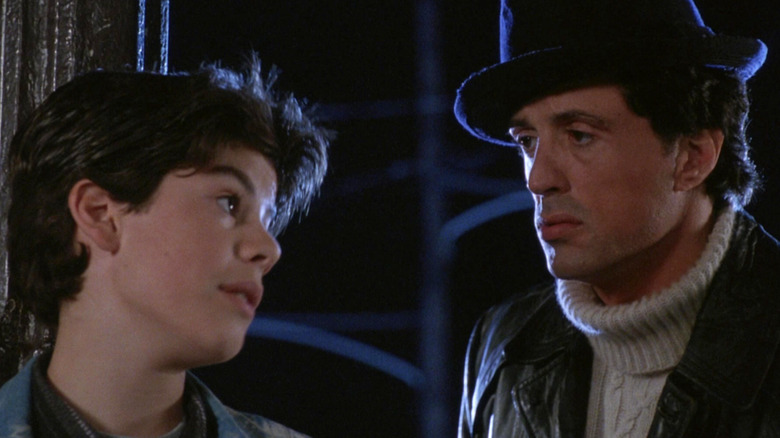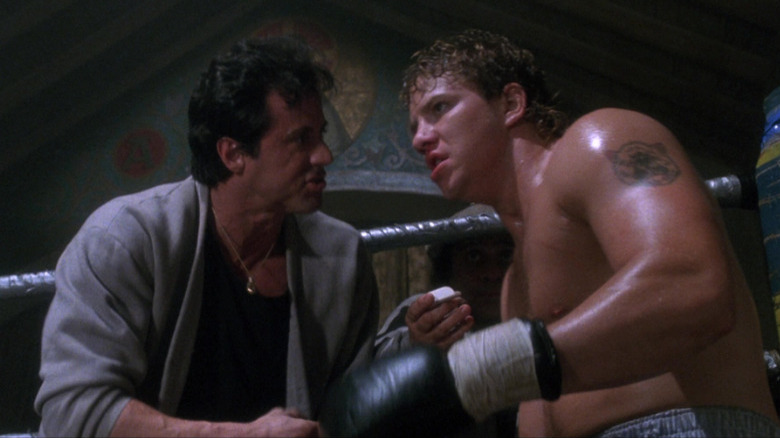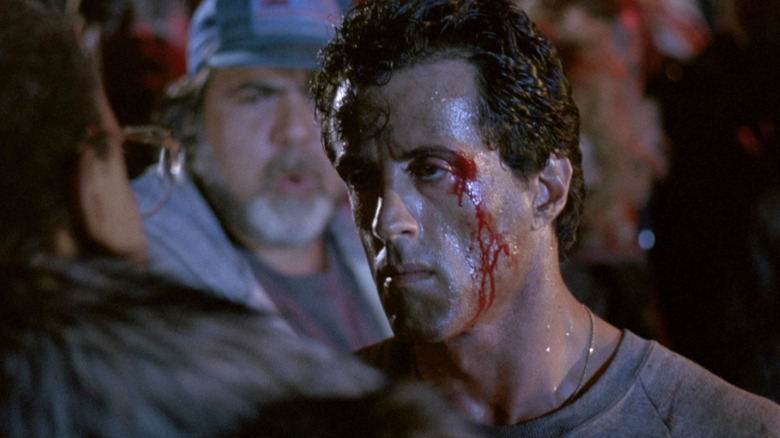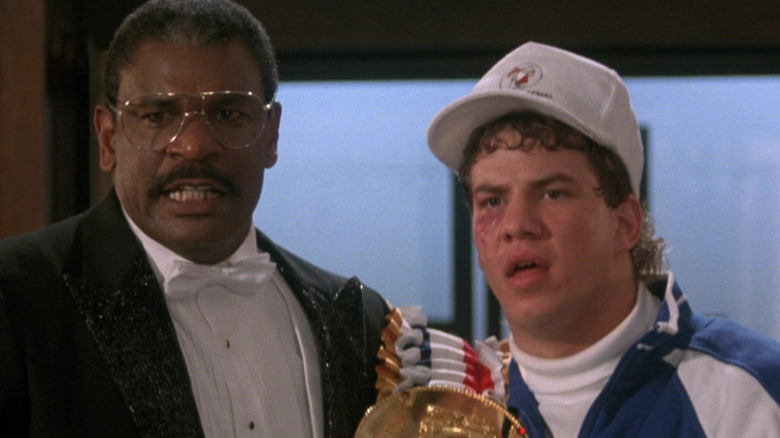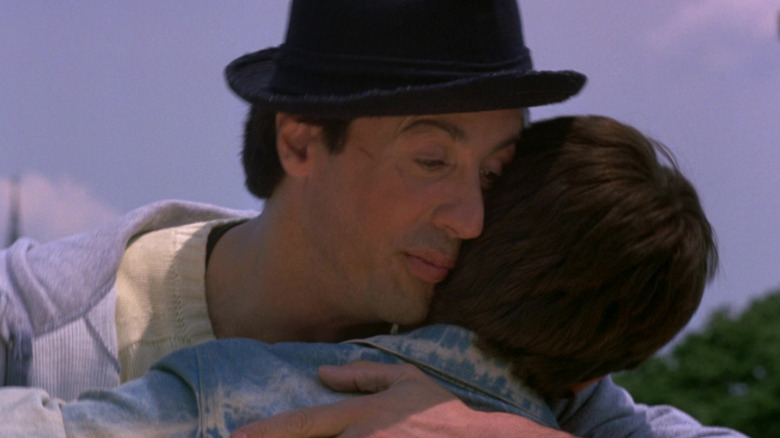Why Sylvester Stallone Is Wrong, And Rocky V Is Good
For nearly fifty years, the saga of Rocky Balboa has been one of the most enduring works of American fiction. The powerhouse first movie told the story of a boxing underdog who gets, and makes the most of, the chance of a lifetime, which dramatically paralleled the rags-to-riches story of the film's own writer and star, Sylvester Stallone, a no-name actor who built a blockbuster career out of "Rocky." It was practically legendary from the start, though its massive success was a double-edged sword.
Over the course of four sequels and a spin-off trilogy, Rocky Balboa proceeded to inspire generation after generation with satisfying stories about defying the odds, reclaiming your dignity, and that one time Rocky bought a robot. But there's one film in the series that most people, including Stallone, don't think was a success.
Actually, that's putting it far too mildly. Stallone has gone on record as saying that "Rocky V" basically stinks out loud, even giving it a "zero" out of ten in an interview with Jonathan Ross. And while some people might agree with him, he's been wrong before — he made "Judge Dredd," didn't he? — and he's wrong about "Rocky V." The film may not be the highlight of the series but it's a satisfying and important chapter in Rocky Balboa's story, and — thanks partly to the sequels and spin-offs that followed — time has been very kind to it.
Let's talk about why "Rocky V" is better than Stallone thinks it is.
Rocky Balboa punches out
It arrived five years after "Rocky IV," the film where Rocky avenged Apollo Creed's death by defeating a Soviet super soldier on Christmas and somehow convincing the Russian audience to cheer for America by sheer virtue of Rocky's unbridled awesomeness. (And also, he bought a robot.) When you put it like that, it's not surprising that "Rocky V" tried to scale the story back a little bit.
Picking up right where "Rocky IV" left off, we find Rocky in a pretty rough place at the beginning of the fifth installment. After multiple films where his family and manager warned him he was getting too old and too seriously injured to box, he's diagnosed with brain damage and has to stop fighting immediately. This couldn't have come at a worse time because his brother-in-law, Paulie (Burt Young), gave away their power of attorney when they left the country, and the Balboa family accountant flushed their life savings away.
Forced to return to their humble home in Philadelphia, the Balboa family picks themselves up again from their bootstraps. Adrian (Talia Shire) goes back to work, their son Robert (Sage Stallone) overcomes his bullying at school, and Rocky manages up-and-coming fighter Tommy "The Machine" Gunn (Tommy Morrison) and treats him like a surrogate son. This only alienates Robert more, since he's actually Rocky's son, and he's being neglected in favor of a stranger.
Rocky coaches Tommy to stardom but a championship match is held out of reach by opportunistic boxing promoter George Washington Duke (Richard Gant), who corrupts Tommy, steals him away from Rocky, and tries to manipulate the two of them into a title bout. When Rocky refuses, Tommy starts a fight in the middle of the street, on live television. Tommy loses and publicly humiliates himself because, unlike Rocky, he cared more about pride than the strength of character.
Ehhh... what's up, Rock?
On paper that sounds like a solid Rocky movie. But movies wind up on celluloid, and sometimes they don't turn out as well as they should. There's a reason "Rocky V" is one of the least popular films in the series, if not the franchise's outright pariah, and some of the critiques are well-deserved.
The plot hinges on a pretty big hole, actually, because in order to get the Balboa family back to square one, they lose all their money and can't get it back. Losing all your money happens all too often, and isn't an implausible scenario. It's being unable to get it back that's admittedly a stretch. Rocky can't box anymore but he was the heavyweight boxing champion of the world and defended the title nine times. Then he lost it, got it back, and became America's greatest boxing champion by defeating Ivan Drago. In "Rocky III" — which could've ended with his death — we even saw that Rocky had overcome his insecurity in front of the camera and did credit card commercials and telethons.
Rocky Balboa is, in no uncertain terms, staggeringly famous and popular. He might not like doing endorsement deals but he absolutely can do them. He can do TV appearances. Heck, he could star in an action movie. Not being able to act didn't stop a heck of a lot of action movie superstars — and there's no reason it should've stopped Rocky. So in order for the plot to work, Sylvester Stallone's screenplay just glosses over all of that. It's a legitimate gripe.
But not all the critiques are equally valid.
Balboas of fury
In an interview with The Sun (via Express), Sylvester Stallone once claimed that "[Rocky V] was a mistake because the audience didn't want to see the downside of the character. They wanted him to remain on top. I should have known that. I fell into a sense of self-parody."
If this is true, and that's what audiences wanted, then it's an excellent reason to ignore audiences. Because "remaining on top" isn't what the "Rocky" movies are about. To paraphrase Stallone's own "Rocky Balboa" screenplay, they are not about "how hard you hit," they're about "how hard you can get hit and keep moving forward."
Every single "Rocky" movie after the first film knocks him down at the beginning so he rises back up again. The difference in "Rocky V" isn't that he got knocked down, the difference is that the film doesn't end with him reclaiming his glory in a big fancy ring surrounded by screaming fans while doing something that'll earn him lots of money and a shiny belt. The best part of "Rocky V" is the way the film argues that the best part of life has nothing to do with celebrity.
"Rocky V" finds Rocky mentoring a boxer who makes a decision to push away his personal connections in favor of fame, glory, and money. Over the course of the film, after trying to reclaim his own glory years by training Tommy Gunn, Rocky gradually realizes that what he cares most about is the people around him, like his son, and yes, Tommy. He doesn't need fame and glory and money to appreciate them. Even setting aside Rocky's health issues, Tommy wasn't worth fighting in the ring. He represents everything Rocky could have been but wasn't, because, despite his many flaws, Rocky had the strength of character.
Rocky is a family guy
One of the biggest reasons why "Rocky V" has a lousy reputation is that, for nearly two decades, it was the final chapter in the Rocky Balboa story. Setting aside that he doesn't regain a title or move back into a fancy house — superficial symbols of success that were never the whole point of "Rocky" — it's a smaller-scale film with an awkward set-up, some not-great acting from Tommy Morrison, and a muted finale. (It almost had a different, more tragic end.) It makes dramatic sense but compared to earlier films, it's not a powerhouse.
So it makes sense that some people were underwhelmed by "Rocky V" in 1990. But that was over three decades ago, and the context surrounding the film changed. It's no longer the final film in the "Rocky" series. Now it's the halfway point if you count all the "Creed" movies.
The dramatic crescendo of "Rocky Balboa" wouldn't have resonated as loudly if, instead of building himself back up on the streets, Rocky decided from the comfort of his mansion to do a little more boxing. And although Rocky and his son reconnect at the end of "Rocky V," in "Rocky Balboa" we learn Rocky continued to struggle to balance fatherhood with his personal goals. Their story packs a bigger wallop because "Rocky V" established it earlier.
The "Creed" movies also benefit from "Rocky V." Adonis Creed (Michael B. Jordan) wanted to build his career from the ground up, and only a Rocky living humbly could have helped him. And only a Rocky who understood the hazards not just of boxing, but managing, could be the mentor Adonis Creed needed.
"Rocky V" returns Rocky to his roots, and from there the franchise grew anew, sprouting more powerful stories and beloved new characters. Ending the series on a high note in 1990 wouldn't have set a stage — it would have pulled down the curtains and turned out the light.
